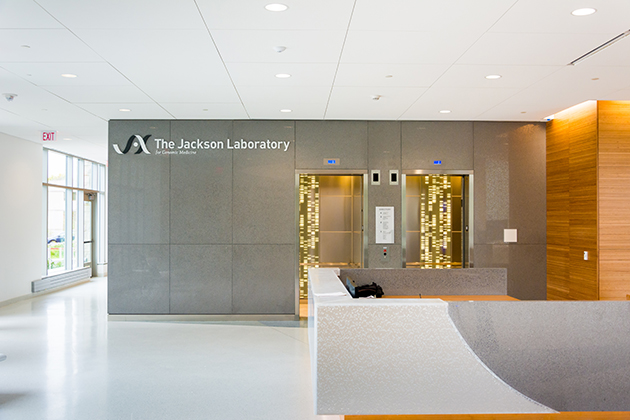Mice may be a nuisance in the home, but Jennifer Allocco ’17 (CLAS) is learning that they’re very important in the lab.

This summer, Allocco, a biological sciences and German double major, is working as an intern in The Serreze Lab at The Jackson Laboratory in Bar Harbor, Maine. Working alongside postdoctoral associate Maximiliano Presa, the 21-year-old is conducting research that will help scientists understand the genetic aspects involved in the development of Type I diabetes.
Presa’s ongoing research focuses on the study of the thymic negative selection process, and Allocco is genotyping mice during her 10-week internship. She uses flow cytometry, a laser-based technology that helps to give specific data about cells, when studying both mice with diabetes and mice without diabetes.
“It’s very interesting,” she says. “I’m learning a lot.”
Allocco says she was encouraged to apply to research experience programs by a staff member at UConn’s Center for Career Development. The Jackson Laboratory Summer Student Program was her first choice, and she was accepted after completing an application and submitting a resume and essay.
The Center for Career Development actively supports and encourages student participation in experiential learning, including internships. These learning experiences provide a tangible way for students to confirm their major or career choice, says Ana Clara Blesso, the center’s assistant director of experiential learning. They also allow students to apply academic knowledge in a professional setting and learn new things, she adds.
Throughout her internship, Allocco says she receives instruction and feedback, but is also able to form her own opinions. She is grateful that Presa allows her to collect and analyze data on her own before he discusses it with her.
In addition to learning more about the project that she is working on, Allocco has the added benefit of learning about projects spearheaded by other Jackson Laboratory scientists. Weekly lab meetings give her exposure to other research topics and lab techniques.
“I don’t always understand everything, but I know enough to be impressed,” she says.
Allocco, of Chatham, N.J., first discovered her interest in biology in high school and she chose to major in biological sciences at UConn.
“I fell in love with the subject,” Allocco says.
When Allocco headed to college, she already knew she didn’t want to be pre-med. She likes research, and her summer internship has only fueled that passion.
“I like the lab,” she says.
At UConn, Allocco is an honors student who works in the Schwartz Lab, a physiology and neurobiology lab that focuses on identifying protein kinase motifs using an E. coli peptide library. While research in the Schwartz Lab is different than research at The Jackson Laboratory, she says many of the same basic skills apply, and adds that her internship is teaching her to be helpful in all areas of a lab.
Allocco, who will be taking the GRE before returning to campus this fall, hopes to earn both a master’s degree and a doctorate after she is awarded her bachelor’s degree.
Allocco is one of 35 students in The Jackson Laboratory’s Summer Student Program in Maine this year. Thirteen students, including other UConn students, are working at The Jackson Laboratory for Genomic Medicine in Farmington.
Each student is a valued member of the company’s research team as they investigate the genetics and genomics of human disease, and every effort is made to place students in labs with mentors of interest, says Mike McKernan, the company’s program director for STEM and undergraduate education.
All summer interns at The Jackson Laboratory work at least 40 hours a week and receive a $5,000 stipend. Expenses, including room, board, and travel are also covered.
This summer marks Allocco’s first trip to Maine, and she is still awed by the state’s beauty. She is sharing a house with other interns and says she is stunned by her surroundings.
“Our backyard is basically a national park,” she says.
McKernan says all interns begin the Summer Student Program by writing research proposals that serve as roadmaps for their research projects. In addition to fulfilling their summer lab responsibilities, students are expected to attend the program’s educational components, which include discussions on ethical, legal, and social issues in genetics. They learn to operate as a member of a research team, to communicate science, to stick with a project when things get frustrating, to come up with new ideas, and to engage their creativity to solve problems.
“The goal of the Summer Student Program is to provide students a research experience in genetics and genomics that will facilitate a career in, or informed by, science,” McKernan says. “Yes, we want to cultivate future scientists, but we also want to cultivate future teachers, physicians, journalists, and entrepreneurs who are inspired by genetics in other fields of work.”



